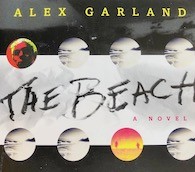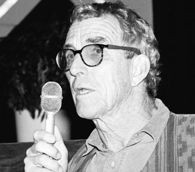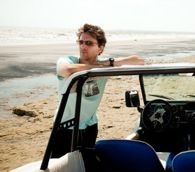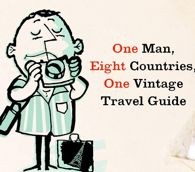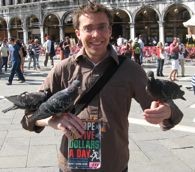Tag: Travel Writing
Back to The Beach: A Lost Interview with Alex Garland
by Frank Bures | 07.23.19 | 7:49 PM ET
Twenty years ago, Frank Bures chatted with a young Alex Garland about his travel novel, The Beach. Bures recently unearthed the interview--a time capsule from the dawn of global backpacking.
2016 Book Passage Travel Writers & Photographers Conference
by Jim Benning | 08.09.16 | 1:46 PM ET
This year’s Book Passage Travel Writers & Photographers Conference—or as many justly call it, summer camp for travel writers—kicks off Thursday in Corte Madera, California. If you’ve ever wanted to study travel writing with a host of accomplished writers and editors, this is the time and place. The four-day conference features classes and panel discussions about the art, craft and business of travel writing and photography—and, just as importantly, hours of conversation over wine and dinner.
I’ll be teaching a series of morning classes with Los Angeles Times staff writer Chris Reynolds.
Also on the faculty are World Hum contributors Lavinia Spalding, Pam Mandel, Candace Rardon, Michael Shapiro, Andrea Johnson, Larry Habegger, Linda Watanabe McFerrin, Spud Hilton and Abbie Kozolchyk. Other luminaries include Don George, Tim Cahill, Elizabeth Harryman, Jeff Greenwald, Janis Cooke Newman and Robert Holmes.
Hope to see you there.
Walking Off Writer’s Burnout
by Jeff Biggers | 09.17.15 | 1:33 PM ET
Jeff Biggers hadn't written anything original in months. The joy was gone. Then he and a friend went for a stroll in Bologna.
How a Taxi Ride Changed a Writer’s Life
by Jim Benning | 07.21.15 | 11:13 AM ET
Layne Mosler's memoir, "Driving Hungry," chronicles her cab-centric quest for great meals and experiences. Jim Benning asks about it.
Find World Hum Writers in ‘The Best American Travel Writing 2014’
by Eva Holland | 10.29.14 | 11:22 AM ET
The latest edition of the annual “Best American Travel Writing” anthology series landed in bookstores this month, and it looks to be full of good stuff, including stories from heavyweights like David Sedaris, Michael Paterniti, and Colson Whitehead.
Two World Hum stories are included this time around: Andrew McCarthy’s Clear-Eyed in Calcutta, and In the Abode of the Gods, by Jeffrey Tayler. David Farley’s A Sort of Happy Ending was included in the notable selections, and World Hum contributors Tom Swick, Tony Perrottet, Frank Bures and Doug Mack were also honored in the book for work published elsewhere.
Congrats to everyone who was included.
Where’s Andrew? At Home.
by Pam Mandel | 06.23.14 | 2:45 PM ET
I didn’t know Andrew Evans when he set out to take the bus to Antarctica. By the time he’d been there and back, we were friends, making plans to meet on stopovers and detours. Now, we trade travel stories and advice, send each other postcards and chat online. But before all that, he was a voice in 140 characters on Twitter under the name@Bus2Antarctica. He was on an adventure I wanted to be a part of. I remember when he posted a picture of himself at a city bus stop with his pack. He was serious; he really was taking the bus all the way from Washington DC to the tail end of the planet. I was hooked, as were thousands of others who tagged along for the ride.
Because his travel stories brought me such joy, my first reaction on learning yesterday that he was going on hiatus was this: Noooooooooo!
As he wrote:
It’s impossibly hard to step away from a dream job that I built from scratch, but after nearly five years on the road, I have decided to take a sabbatical from this blog and its accompanying lifestyle. Over the next year, I intend to write my next book and spend a lot more time with my dog.
Andrew’s Bus2Antarctica project wasn’t the first time someone had chronicled a travel experience on Twitter, but it may be the first instance of a major travel publisher—National Geographic—putting its eggs in a basket that carried a mere 140 characters. Andrew’s ability to both be present in his travels and to share them in little haiku-like snapshots enchanted his followers. We wanted desperately to know what was going to happen next. Twitter was still a mystery to many of us when Andrew starting using it to share his adventures. He showed us how we could use this medium for maximum impact.
I’m one of many who, after seeing his penguin photos, asked if he could please bring me a penguin chick. When we met for the first time—after a series of missed connections— he handed me two fluffy little penguin plush toys. “This one is named Frida,” he said, “and you’ll have to name the other one.” I’d been considering a trip to Antarctica but I was hesitant. I get terribly seasick. We’d been trading email about the trials of crossing the Drake, but Andrew wouldn’t hear of my staying home. “You’re going,” he said, “and you should take them with you. You need mascots.” I went, and in one of those funny travel coincidences, I crossed paths with Andrew in Santiago, Chile, where I’d stopped over on my way back from Antarctica. We went for ice cream at an upscale shopping mall. “You were right,” I said. He did not say, “I told you so.”
Heather on the path/ Where the mountains disappear/ Ever-changing clouds.—Isle of Sky, Scotland
Another soft yawn of the leopard’s jaws, though it looks like she’s laughing at the funniest joke in the world. —Londolozi Game Reserve, South Africa
Andrew took us all over the world—to the middle of the Atlantic and up Kilimanjaro and, most recently, to the heart of Nashville. When he wasn’t on Twitter, he wrote for his blog or for the magazine, National Geographic Traveler. But Twitter was where we could always find him. A guy with more than 30,000 followers and often in demand, he made time for fourth graders, grown-ups with a sense of adventure, and like-minded friends. We can still find him on Twitter, though we’re more likely now to see him posting photos of his dog’s quizzical face—or maybe we’ll hear about his progress on the book we all want him to write.
Andrew’s (hopefully temporary) goodbye to his readers was touching and personal.
A story isn’t a story until somebody listens, so thank you all so much for listening and following my travels. I believe strongly in Tim Cahill’s sentiment that, “A journey is best measured in friends, rather than miles.” Though I lost count after the first million miles, I remember all of my friends around the world, even those I knew briefly—sitting next to me on a train, behind the bar, or chatting around a campfire.
From the bottom of my dingy backpack, thank you. Thanks for reading, commenting and encouraging me in my work. I am lucky to have never been lonely on the road, because I’ve always had you with me.
No, Andrew. Thank you.
Discovering Peter Matthiessen—and Myself
by Lynne Friedmann | 05.02.14 | 12:08 PM ET
Lynne Friedmann never thought she could make a life as a science writer. Then she read "Blue Meridian."
Why is This Man Walking Around the World?
by Jim Benning | 03.21.14 | 12:26 PM ET
Aspiring travel writers can choose any number of paths. They can start a blog, or intern at a magazine, or simply start pitching stories to editors.
But 24-year-old Ryan Newburn is taking a different approach. He plans to spend four or five years walking around the world—almost literally. He’ll hoof it across Japan, then New Zealand, then Australia, and then he’ll work his way up Southeast Asia, and that’s only the beginning.
Why?
Among other things, the Nebraska native told Newsweek: “I thought about what I wanted to do with my life, and I’ve always wanted to be a travel writer. I want to meet extraordinary people from all walks of life, all over the world, and write about them.”
Well, if he pulls off the epic trek, he’ll have one incredible story to tell.
David Grann Talks Writing on Reddit
by Jim Benning | 03.01.14 | 2:58 PM ET
I’m a big fan of David Grann, so I was happy to see the New Yorker staff writer and “The Lost City of Z” author answering questions on Reddit yesterday.
A number of questions focused on “Z.” Among the other highlights:
Hi David, I’ve always wondered - how do you know when a story is a story worth pursuing? Thanks
Alas that’s the problem. I don’t always know in the beginning and I spend a lot of time trying to figure out whether a story has compelling characters and storylines, whether there are intriguing subcultures or worlds to explore, and whether the story is about something with larger import. Which is perhaps why I’m always missing my deadlines.
Related on World Hum: Interview with David Grann - ‘The Lost City of Z’.
World Hum Writers Honored in ‘The Best American Travel Writing 2013’
by Eva Holland | 10.21.13 | 11:08 AM ET
It’s that time of year again. The 2013 edition of the annual Best American Travel Writing anthology hit bookstores last week, and we’re thrilled to learn that three World Hum stories were listed in the notable selections: Jessica Colley’s Catching the Gist, Translating Respect by Lenore Greiner, and Bali Belly and the Zombie Apocalypse, by Linda Watanabe McFerrin. Longtime World Hum contributor David Farley also had an AFAR magazine story included in the collection.
This year’s book was guest-edited by travel writing titan Elizabeth Gilbert. Check it out.
2013 Book Passage Travel Writers & Photographers Conference
by Jim Benning | 08.01.13 | 11:40 AM ET
Travel publishing has undergone a transformation in recent years. Countless newspaper travel sections have shut down. Venerable guidebook publishers such as Lonely Planet have wound up in the most unlikely hands. Magazines have come and gone, and the travel blogosphere continues to evolve.
Happily, through it all, the Book Passage Travel Writers & Photographers Conference endures. Now in its 22nd year, the four-day conference kicks off Thursday, Aug. 8 in Corte Madera, California, emphasizing the craft of storytelling—on blogs and in essays, in books and through photography.
I’ll be teaching travel writing for the web with blogger extraordinaire Pam Mandel in morning sessions. As always, I’m looking forward to it. The conference is one of the highlights of my year. Conference chair Don George infuses the four days with a lot of heart. After the seminars and panels each day, students and faculty mix over meals and drinks well into the night. At some point, you realize you really don’t want the weekend to end. Everyone leaves feeling inspired.
There’s still time to reserve a spot at the conference. You can check out the faculty and conference schedule here.
The End of Wend
by Brian Kevin | 02.26.13 | 2:38 PM ET
The travel mag was like Chicken Soup for the Gnarly Eco-Nomad's Soul. Brian Kevin ponders what its demise says about travelers and travel publishing.
Travel Story Hall of Fame: ‘As Long As We Were Together, Nothing Bad Could Happen To Us’
by Eva Holland | 02.04.13 | 9:49 AM ET
The latest installment of the Travel Story Hall of Fame, an occasional series in which we honor the best in travel writing new and old.
Title: As Long As We Were Together, Nothing Bad Could Happen To Us
Author: Scott Anderson
Publication: Men’s Journal
Date: August 2000
Nomination Speech: I just plain love this story. I first read it in “The Best American Travel Writing 2002,” and then again (and again and again) in the excellent Men’s Journal anthology, “Wild Stories.” It’s an old-fashioned adventure story about Scott Anderson and his brother, fellow writer Jon Lee Anderson, taking a Honduran river trip on a makeshift raft, at the tail end of their decidedly unconventional childhoods, but the yarn is spiced up by the contemporary frame: The brothers, now adults and reporters specializing in conflict zones and high-risk stories, being drawn back into danger again and again. It’s a great story about family and trust and risk—oh, just go read it.
Excerpt:
I imagine that everyone’s childhood, no matter how unconventional or exotic, seems absolutely normal while it’s being lived. By the time I arrived in Honduras, I was only beginning to comprehend the downside of how we had grown up, the hidden cost that comes with not being from anywhere in particular. Jon, it seemed, had figured it out a little bit sooner. In the years ahead, we would both be caught up in a seemingly endless cycle of trying to fit in, failing, moving on. In a funny way, I think we both drew a certain comfort in the other’s inability to settle down—proof that there was at least one more misfit in the family.
Men’s Journal doesn’t have it online, but you can read the rest via Google Books.
Interview with Andrew McCarthy: A ‘Strange Second Act’
by Jim Benning | 10.09.12 | 8:53 AM ET
Jim Benning asks the actor, director and writer about his new book and his second career in travel writing
R.I.P. Paul Fussell, Scholar, Travel Writing Critic
by Jim Benning | 05.24.12 | 11:21 AM ET
The Pasadena-born scholar, who died yesterday at the age of 88, wrote more than 20 books on a wide range of topics, including war and class. He’s revered in travel-writing circles for his 1980 book, Abroad: British Literary Traveling Between the Wars. It seems a rather obscure topic for a book that would spur debate among travelers and writers for decades, but Fussell was an opinionated critic who took aim at modern tourism and its effect on travel writing.
World Hum contributor Tom Swick reflected on the book and its influence today:
It was like a course no college ever taught—British Travel Writing 101, my first introduction to a distance university. The scholarship was rugged, eclectic and sweeping; the writing authoritative, engaging and witty. With chapters titled “L’Amour de Voyage” and “The New Heliophily,” the book reinforced the image of travel writing as a romantic endeavor, but it also championed it as an art. Here, it said, is an overlooked genre that has been practiced by some of the greatest writers of the 20th century. Here is a literature worthy of academic regard.
The second of these ideas turned out to be the more prophetic. Travel writing continues—despite Fussell’s assertion that tourism killed it—but without the participation of the day’s great novelists. At the same time, academic papers and conferences on travel writing keep proliferating. It is ironic that the book that announced the death of travel writing gave birth to the field of travel writing scholarship.
Of modern tourism, Fussell wrote: “Tourism soothes you by comfort and familiarity and shields you from the shocks of novelty and oddity. It confirms your prior view of the world instead of shaking it up. Tourism required that you see conventional things, and that you see them in a conventional way. Tourism can operate profitably only as a device of mass merchandizing, fulfilling the great modern rule of mediocrity and uniformity.”
Fussell has been cited on World Hum a number of times over the years. A few highlights:
- Non-Places and the End of Travel by Frank Bures
- The Trouble with ‘Smile When You’re Lying’ by Rolf Potts
- Not a Tourist by Tom Swick
- No Place Exists That’s not Worth Writing About by Tom Swick
- China: Not a ‘Psuedo-Place’ by Eva Holland
- ‘Fussel Was Right. We Are All Tourists’
Jon Krakauer: Writing is like Rock Climbing
by Eva Holland | 04.26.12 | 9:51 AM ET
This week I’ve been making my way through a collection of interviews called The New New Journalism: Conversations with America’s Best Nonfiction Writers on Their Craft. It’s an interesting read. The writers—everyone from Gay Talese to Eric Schlosser and Susan Orlean—describe how they work, from story idea through interviewing to writing and editing.
In one section, Jon Krakauer explains his use of outlines. It involves a lot of hand-written scenes pinned to his office wall in sequence. The book’s author, Robert S. Boynton, asks him where he got the technique.
Here’s Krakauer’s reply:
Rock climbing. When you embark on a really big climb like, say, the Salathé wall of El Capitan, which rises three thousand vertical feet from the floor of Yosemite Valley, the enormity of the undertaking can be paralyzing. So a climber breaks down the ascent into rope-lengths, or pitches. If you can think of the climb as a series of twenty or thirty pitches, and focus on each of these pitches to the exclusion of all the scary pitches that still lie above, climbing El Cap suddenly isn’t such an intimidating prospect. By following an outline I can focus on the chapter that’s in front of me… It makes writing a book much less terrifying.
Travel Writing: ‘Almost as Over-Romanticized as Bacon’
by Jim Benning | 04.10.12 | 11:08 AM ET
Every spring I teach a travel writing class at New York University. Within the first five minutes of the first class, I tell my students the bubble-bursting secret: that being a travel writer is almost as over-romanticized as bacon, Brooklyn and Italy. Not that I’m necessarily complaining. Sometimes on the road, we can experience glimpses of a decadent life of Hemingwayan proportions, but when we get back home, the cash-strapped reality sinks in as quickly as it takes to boil a packet of Top Ramen. Travel we most certainly do; money we most certainly do not make.
The Critics: ‘‘Wild’ by Cheryl Strayed
by Jim Benning | 04.05.12 | 10:39 AM ET
Strayed’s memoir about hiking the Pacific Crest Trail while reflecting on her life, including the death of her mother, is getting rave reviews.
This is a long way from Bill Bryson’s “A Walk in the Woods.” Apparently it’s no “Eat, Pray, Love,” either.
From Slate:
By laying bare a great unspoken truth of adulthood—that many things in life don’t turn out the way you want them to, and that you can and must live through them anyway—Wild feels real in ways that many books about “finding oneself,” including Eat, Pray, Love and all its imitators, do not. The hike, rewarding though it is, doesn’t heal Strayed. “I’d thought I’d weep tears of cathartic sorrow and restorative joy each day of my journey,” she writes. “Instead, I only moaned, and not because my heart ached. It was because my feet did and my back did and so did the still-open [pack] wounds around my hips.”
I’m a big fan of Brad Listi’s Other People podcasts, featuring wide-ranging, hour-long conversations with authors. He spoke with Strayed in February:
Old Guidebook, New Life
by Doug Mack | 04.02.12 | 10:52 AM ET
In an excerpt from "Europe on 5 Wrong Turns a Day," Doug Mack envisions a new future for himself in a vintage guidebook
Interview with Doug Mack: ‘Europe on 5 Wrong Turns a Day’
by Leif Pettersen | 04.02.12 | 10:50 AM ET
Leif Pettersen talks to the author about his new book, travel snobbery, and traveling with "Europe on Five Dollars a Day"
- « Prev Page
- Next Page »
